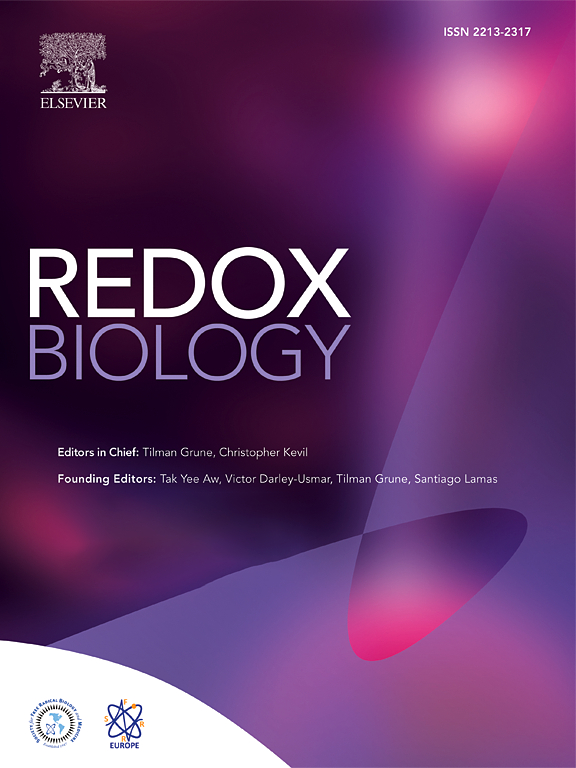CD40-TRAF6 inhibition suppresses cardiovascular inflammation, oxidative stress and functional complications in a mouse model of arterial hypertension
IF 10.7
1区 生物学
Q1 BIOCHEMISTRY & MOLECULAR BIOLOGY
引用次数: 0
Abstract
Cardiovascular disease is the leading cause of disease burden and death worldwide and is fueled by vascular inflammation. CD40L–CD40–TRAF signaling is involved in the progression of atherosclerosis and drives the development of coronary heart disease (CHD). The present study investigates whether the CD40L-CD40-TRAF6 signaling pathway with focus on immune cells and adipocytes could be a therapeutic target in arterial hypertension.
Arterial hypertension was induced in WT (C57BL6/J) and cell-specific CD40(L) knockout mice (AdipoqCre x CD40 fl/fl, CD4Cre x CD40 fl/fl, CD19Cre x CD40 fl/fl, and GP1baCre x CD40L fl/fl) via angiotensin (AT-II) infusion (1 mg/kg/d) for seven days. Hypertensive WT mice were also treated with a CD40-TRAF6 inhibitor (2.5 mg/kg/d, for 7d). The TRAF6 inhibitor treatment normalized endothelial dysfunction and reduced blood pressure in hypertensive wild type animals. Reactive oxygen species production was decreased by TRAF6 inhibition in blood, aorta, heart, kidney, and perivascular fat tissue. Additionally, FACS analysis revealed that TRAF6 inhibition prevents immune cell migration into the aortic vessel wall observed by reduced CD45+ leukocyte, Ly6G+/Ly6C+ neutrophil, and Ly6Chigh inflammatory monocyte content. The hypertensive cell type-specific CD40(L) knockout animals showed only a minor effect on endothelial function, blood pressure, and oxidative stress. Therefore, we conclude that targeting CD40 directly on adipocytes, B-cells, T-cells, or CD40L on platelets is not a promising target to prevent hypertension complications.
In summary, TRAF6 inhibition but not adipocyte, B-cell, or T-cell-specific CD40 or platelet-specific CD40L deficiency reduces pathophysiological vascular inflammation in hypertensive mice, suggesting TRAF6 inhibition as a potential therapeutic target in hypertensive patients.

求助全文
约1分钟内获得全文
求助全文
来源期刊

Redox Biology
BIOCHEMISTRY & MOLECULAR BIOLOGY-
CiteScore
19.90
自引率
3.50%
发文量
318
审稿时长
25 days
期刊介绍:
Redox Biology is the official journal of the Society for Redox Biology and Medicine and the Society for Free Radical Research-Europe. It is also affiliated with the International Society for Free Radical Research (SFRRI). This journal serves as a platform for publishing pioneering research, innovative methods, and comprehensive review articles in the field of redox biology, encompassing both health and disease.
Redox Biology welcomes various forms of contributions, including research articles (short or full communications), methods, mini-reviews, and commentaries. Through its diverse range of published content, Redox Biology aims to foster advancements and insights in the understanding of redox biology and its implications.
 求助内容:
求助内容: 应助结果提醒方式:
应助结果提醒方式:


